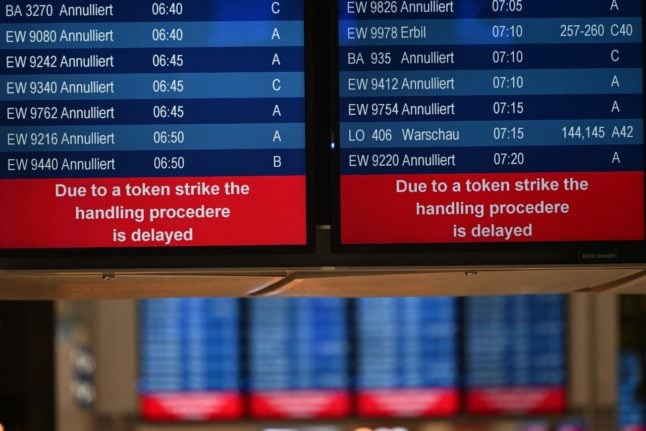The trade union Verdi and private aviation security service employers have agreed on arbitration in the wage dispute for around 25,000 employees around Germany.
The process, led by former Bremen State Councillor for Finance Hans-Henning Lühr (SPD), is set to begin on Friday, April 5th and end on Sunday April 7th at the latest, as the union and the employers’ association BDLS announced on Tuesday.
“This agreement rules out further strikes, at least in our sector, over the Easter weekend and in the following week of holidays,” said BDLS head of negotiations Frank Haindl.
But depending on the result of the negotiations, strikes could continue into May – a big travel month in Germany with three national public holidays – and the summer.
A few days ago, Verdi had described arbitration as the last resort for a solution. Warning strikes by aviation security staff have temporarily paralysed various German airports in several waves over the past few weeks.
READ ALSO: Why Germany is being hit by strikes almost every day
The staff employed by private service providers check passengers, staff and baggage at the entrances to the security area on behalf of the Federal Police.
The main sticking point in the negotiations for the approximately 25,000 employees is overtime bonuses.
Verdi is demanding €2.80 more pay per hour, higher functional bonuses and overtime bonuses from the first hour of overtime for a collective agreement term of twelve months. According to their own information, the employers most recently offered €3.25 per hour for a term of 24 months with effect after 12 months.
Are strikes in other airport sectors possible?
In addition to aviation security, there are currently other wage disputes in the aviation industry. After several rounds of warning strikes, arbitration for ground staff at Lufthansa has been ongoing since Monday, with results expected on Thursday.
Lufthansa flight attendants have also already gone on strike for higher salaries, but no solution has yet emerged.
In addition, pilots and cabin crew at Lufthansa subsidiary Discover are demanding a first pay scale for the recently founded airline.
Germany has recently been hit by a wave of strikes occurring almost every week for rail and train travellers, as well as numerous other public sectors. But as of Tuesday, train passengers can rule out strikes over Easter – and for the next two years – as Deutsche Bahn reached an agreement with the German train drivers union GDL.
READ ALSO: ‘A difficult road’: Strike hit Deutsche Bahn agrees to shorter work week



 Please whitelist us to continue reading.
Please whitelist us to continue reading.
Member comments